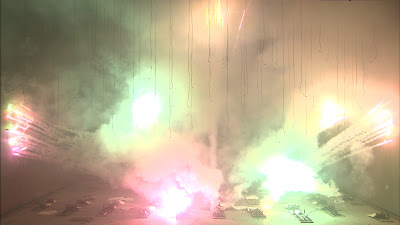It is rare that a horrific fish disaster sorts your head out. But it can happen.
Last week over 1 million sardines were found one morning, dead, in Redondo Beach marina in California. You can watch the report here or here: http://bbc.in/gf9p4h
Current apparent apocalypse notwithstanding (is it just me or does it seem like a succession of End of Days scenarios are playing out all across the world right now, or is it just that I watch too much news and it skews my perspective as in Gerbner's Mean World Syndrome: http://en.wikipedia.org/wiki/Mean_World_Syndrome)
these natural events do happen.
these natural events do happen.
 We have understood the science about them - we know that when fish come into harbour to shelter from the storm in huge numbers then they will starve themselves of oxygen. However, my initial reaction to this, as perhaps your was, was "Oh Jesus and Mary Chain, no, not like this, who is doing this, is it the final judgement?" and so on. I felt similarly when I looked up at the weekend and saw the ginormously big Super Moon looming like a harbinger of doom in the skies (http://science.nasa.gov/science-news/science-at-nasa/2011/16mar_supermoon/).
We have understood the science about them - we know that when fish come into harbour to shelter from the storm in huge numbers then they will starve themselves of oxygen. However, my initial reaction to this, as perhaps your was, was "Oh Jesus and Mary Chain, no, not like this, who is doing this, is it the final judgement?" and so on. I felt similarly when I looked up at the weekend and saw the ginormously big Super Moon looming like a harbinger of doom in the skies (http://science.nasa.gov/science-news/science-at-nasa/2011/16mar_supermoon/). Whenever we see events like this, our initial and uncontrollable reaction is that of unthinking, panic-drive, reptilian fear. We assuage the terror with understanding, but that does not in any way take away from the fact that we, as humans, have to reconcile those two aspects of our comprehension of the world around us.
Joseph Campbell draws the beautiful analogy of sleep to explain wildly different levels of unerstanding humans experience at one and the same time - similarly expressed by the Hindu symbol 'AUM' or :
"The first plane is that of waking experience: cognitive of the hard, gross, facts of an outer universe, illuminated by the light of the sun, and common to all.
The second plane is that of dream experience: cognitive of the fluid, subtle, forms of a private interior world, self-luminous and of one substance with the dreamer.
The third plane is that of deep sleep: dreamless, profoundly blissful."
As far as I can understand it, that first quivering of fear we all experience when we see harbours full of dead fish and accidentally think it is the Second Coming, is the same feeling we get when something from the dream state (the "second plane") enters into our normal experiential realm of sensory perception and logic and reason. It is the same disquieting invasion of our accepted reality that makes David Lynch or Richard Linklater films so unsettling, for example (http://flimgeeks.com/blog/twin-peaks-throwing-rocks-dreams/).
In the same way that we soothe our panic about the dead fish disaster by understanding the science behind it, the domain of science is exclusively that of the first plane - Science as Wakefulness. Science is a mutually upheld human endeavour, stripped of individual foibles, and it needs to be in order to express the closest approximation of What Is Going On. If it weren't for Platonian misconceptions of scientific method, based on theory over observation, we may have had a 2,000 year headstart on ourselves in terms of what we experience in our waking life.
On the other hand, Religion in all its guises belongs steadfastly to the second plane - Religion as Dreaming. This is the internalised, private world of our own interpretations of the world, best expressed by the empirical, waking world that is shown by science. The danger comes when religion purports to belong to the first realm and describe things literally:
 |
| Looks quite a lot like the images of entropy within stars, doesn't it? |
"Mythology is defeated when the mind rests solemnly with its favourite or traditional images, defending them as though they themselves were the message that they communicate. These images are to be regarded as no more than shadows from the unfathomable reach beyond, where the eye goeth not, speech goeth not, nor the mind, nor even piety.
Like the trivialities of dream, those of myth are big with meaning."
It is possible and correct that all stages of the sleep-of-life are experienced and equally valid. In the same way, science, religion and all that is in between are also equally valid, but only as long as they don't encroach on a realm that isn't theirs.
















